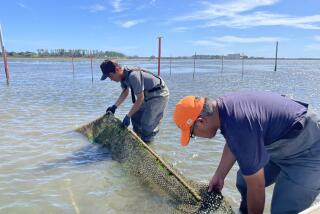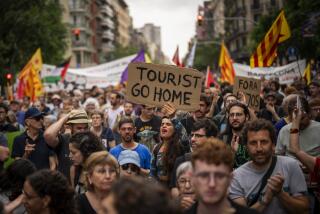Canadian Federalists See No Threat in Quebec Results : Politics: Despite victory by separatists, defenders of unity note their failure to win a majority of votes.
- Share via
QUEBEC CITY — Defenders of Canadian national unity expressed confidence Tuesday that they can defeat efforts by the newly elected separatist government of Quebec to achieve independence for the mainly French-speaking province.
Indeed, Monday’s election of the Parti Quebecois here seemed to have a little something for everybody. The separatists--or sovereigntists, as they prefer to be called--won a strong majority of 77 seats in the 125-member provincial Parliament. Parti Quebecois leader Jacques Parizeau will be sworn in as premier later this month and has said he will immediately begin working toward a provincial referendum on independence.
But Canadian federalists were encouraged by the extremely close popular vote--44.7% for the PQ to 44.3% for the anti-separatist Liberals--and by the fact that Parizeau’s party failed to win a majority of the votes cast. (Each district is decided on a winner-take-all basis.)
They also cite polls that show only about 40% of Quebeckers would vote for independence today.
“The PQ won a victory, it’s in power, but certainly not the victory the polls predicted and the victory they wanted,” said Maurice Pinard, a sociology professor at McGill University in Montreal who has written extensively on the Quebec political situation.
“If they can’t win an election with more than 45% of the vote, how can they win a referendum? It seems to me they’re in real trouble on that.”
“It appears from the statistical analysis that this was (a vote) for a change of government but not for separatism. I only wish we could have the referendum tomorrow so we could put it behind us,” Stanley Plotnick, a Montreal businessman and community activist, said in a telephone interview.
Jean Charest, leader of the Progressive Conservative Party and an expected leader in the campaign against a separatist referendum, warned that the Parti Quebecois will have powerful tools to advance its agenda and that defeat of the referendum should not be taken for granted.
“Parizeau now controls the levers of government, and he knows how to use them and he will use them,” Charest said from his office in Ottawa.
One PQ insider predicted privately that Parizeau will seek to provoke the federal government and Prime Minister Jean Chretien in an effort to make the central government appear obstructionist. This, in turn, would be used in the campaign for independence.
Lucien Bouchard, the separatist leader in the federal Parliament, predicted conflict with Chretien in an interview after the votes were counted Monday.
The Parti Quebecois was able to run up a large parliamentary majority despite the close popular vote because of the sharp division of the electorate along linguistic lines. The Liberals, led by outgoing Premier Daniel Johnson, ran up large majorities in their English-speaking stronghold districts in Montreal. The Parti Quebecois won most of the French-speaking districts, but not by the large margins expected.
Pre-election polls had projected that the Parti Quebecois would win more than 80 seats--some suggested as many as 90--and a popular vote in the 49% range.
The poorer-than-expected showing will bring pressure on Parizeau to give the most prominent role in the referendum campaign to Bouchard, who is considered far more popular and dynamic.
Another key to the separatist strategy will be to portray the choice for Quebeckers as a stark one of the status quo versus independence. This is aimed at the large middle ground of French-speaking voters who are wary of independence but would like Canada to cede more control over government programs and institutions to the provincial government.
Many French speakers here believe fundamental reforms are necessary to preserve the Quebec language and culture, surrounded as it is by English-speaking North Americans. But the rest of Canada often interprets such moves as special treatment for Quebec.
Charest said he is preparing proposals that could meet Quebec’s concerns without offending other Canadians and that he will disclose them as part of the referendum campaign.
Chretien said Tuesday that he is not interested in undertaking constitutional initiatives aimed at Quebec. He said he will press forward with planned economic and social reforms regardless of their impact on a referendum campaign.
“For me, the results of yesterday, short of the victory of Mr. Johnson, (were) the best I could hope for,” Chretien said.
There also were sighs of relief in many English-speaking neighborhoods of Quebec. During the first Parti Quebecois government, in 1976-84, an estimated 140,000 English speakers and hundreds of businesses left the province, feeling unwanted and without a future. No similar exodus is expected now.
“I haven’t heard of anybody preparing to take off, whereas the last time you could see all the (for-sale) signs going up,” said Joan Winser, an English-speaking political activist in Montreal who was Canada’s consul general in Los Angeles for five years in the 1980s.
In the village of North Hatley southeast of Montreal, Jackie Donnachie, 46, also was feeling more serene. Two weeks ago, standing behind the counter of the North Hatley Emporium where she works, Donnachie was anticipating a Parti Quebecois landslide and contemplating her family’s future. Her husband, Dave, 51, had an American mother and recently applied for U.S. citizenship.
Speaking by telephone Tuesday, Donnachie said her reading of the results was that there was little sentiment for separation.
But her husband is not withdrawing his citizenship application.
“I don’t think we’re going to burn any bridges. It’s good to know you have options if we need them down the road,” she said.
More to Read
Sign up for Essential California
The most important California stories and recommendations in your inbox every morning.
You may occasionally receive promotional content from the Los Angeles Times.












